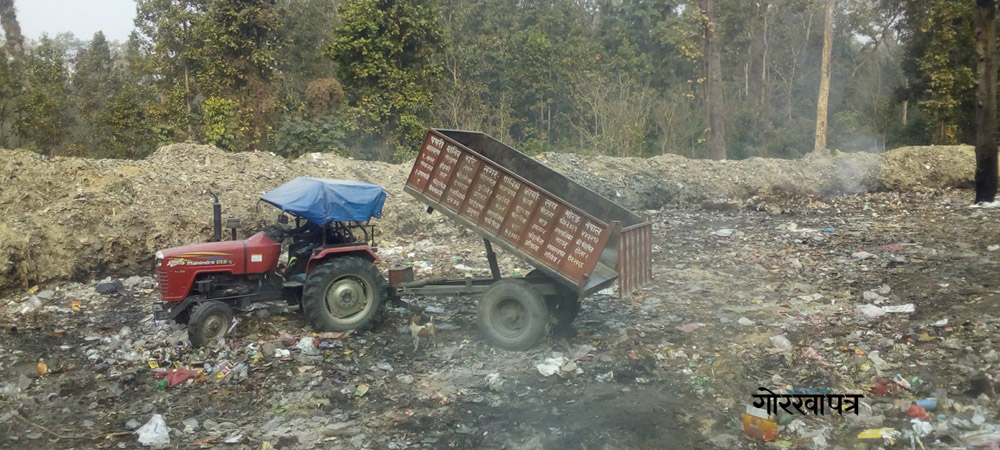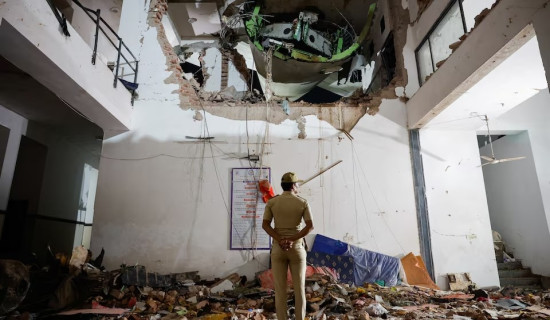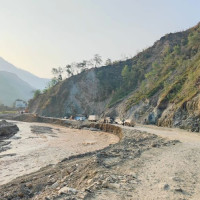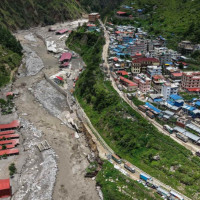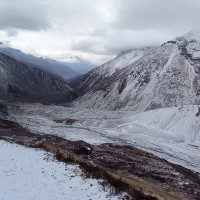- Thursday, 17 July 2025
Waste management becomes messy at local levels
By Hari Prasad Koirala/Siraj Khan, Urlabari/ Nepalgunj, Mar. 3: Sustainable waste management has become a far cry at the local levels in Morang even after six years since the formation of local bodies.
According to the new political structure, even after six years have passed since the formation of the municipality and rural municipality, the local level of East Morang has not been able to solve the waste problem.
Patharishanishchare Municipality and Kanepokhari Rural Municipality, which are undergoing rapid urbanization, are still dumping garbage in forest areas, while Urlabari Municipality is dumping it on the bank of the Bakraha River.
After the addition of Shanishare and Hasandah from the earlier Village Development Committee to Patharishanishare Municipality, it has been facing the problem of waste management though the problem existed even before the formation of the municipality.
It has been a decade since the waste was dumped there. However, the construction of an organized dumping site is only becoming a fantasy. Although the local Shanti Community Forest User Group has repeatedly written to the municipality to find an alternative for dumping waste, the municipality has not been able to purchase the land to build the dumping site.
Mohan Prasad Tumbapo, Mayor of the Municipality, said, “The municipality is serious about solving this waste management problem and looking for land. Discussions are being held with neighbouring rural municipalities for the construction of a common dumping site.”
It is challenging to collect waste from the big market area. And more than that, it is even more challenging to collect the waste from the new markets in the south and put it in a tractor and bring it to the dumping area. The dumping site is 12 km north of Kirtipur market, the southern market of the city, he said.
“There is an obligation to cover the garbage with a normal tent. Half of the dirt put in the old tractor is scattered on the road,” Tumbapo added.
According to Surendra Rai, Chief of the Environment and Disaster Management Unit of the municipality, four tractors are used to pick up garbage three times a day and collect 35 cubic meters of garbage every day in the city.
Due to a lack of human resources, there is a problem with collecting garbage in a municipality with a large geographical area. But the waste is collected daily in the main market, he added.
On the other hand, a private company has been given the responsibility to manage the waste of Urlabari town. The waste collected by the company has been dumped on its own land on the banks of the Bakraha River. However, after flooding, all the waste reaches the farmer’s fields.
Netra Ghimire, the owner of Jayashree Pathibhara Environmental Care Pvt. Ltd., who has been given the responsibility for waste management, said, “The contract was signed for Rs. 3.2 million annually but we applied to cancel the contract owing to losses. Again, the municipality asked to abide by the contract.”
According to the residents of the city, no one is responsible for waste management in Urlabari, where eight tractors of garbage are mobilised daily.
On the other hand, Kanepokhari Rural Municipality has been throwing garbage in the forest area protected by the Rural Improvement Community. Bhola Prasad Adhikari, Vice Chairman of the rural municipality, said that with the increase in urbanization, garbage disposal has increased.
According to the official, the rural municipality has been collecting two tractors of waste daily and dumping it in a ditch in the forest. The municipality does not charge the consumers for collecting waste.
Santosh Ghimire, the Chief Administrative Officer of the rural municipality, said that the rural municipality has been looking for a permanent solution.
Dhana Kumar Tamang, Chairperson of Pathari Industry and Commerce Association, said that when garbage was dumped in the forest, the outbreak of smoke-borne diseases increased in the nearby settlements. A bad smell spreads from the dumping site to the nearby settlements.
Hair from salons and beauty parlours, chicken feathers, empty bottles of alcohol, water bottles, saline water bottles, infected cotton from hospitals, sanitary pads, ‘foam’ from pieces of glass and electronics are tied and thrown together, so even the fire cannot be extinguished, Tamang said.
Meanwhile, our Nepalgunj correspondent Siraj Khan reported that the lack of proper management of the waste produced by Karnali Distillery Private Limited operating in Janaki Rural Municipality-4 of Banke has been creating problems for humans as well as agricultural production.
Due to the stink and garbage coming from the waste, people in nearby areas face problems moving and eating. The waste has also damaged the crops planted by the local farmers.
They complain that the stench of waste coming out of the distillery has directly affected people’s health in the surrounding area. Tilak Bir Sunar of Khajura Rural Municipality-4 said that the environment of the area became polluted when the waste from the liquor industry was dumped directly onto the river bank.
It is found that to manage the liquid coming out of the distillery, the company directly dropped waste onto the river bank in Janaki Rural Municipality, so it had a great impact on the date and palm plantation around it, he added.
Distillery’s canal comes directly and merges with small rivers. Due to this reason, residents have often complained about the bad smell and polluted water, said Ram Pyari Yadav, the Vice Chairperson of the rural municipality.
Deepak Thapa of Khajura Rural Municipality-4 said that if the animals eat the wastewater flowing in the rivers, they get sick, and no crops planted in the fields grow. According to Thapa, the problem of headaches is growing due to the smell of the factory. Locals said the garbage has also damaged Sainik, K Gau, A Gau, Sitapur and Radhapur within the rural municipality area.
Vice Chairperson Yadav said the local’s complaints were found to be valid during the monitoring and inspection of the distillery. If it is not managed quickly, they will start a legal process as per the provision in the Local Government Act. When trying to contact Lekhendra Pandey, the manager of Karnali Distillery, he did not want to respond. Even when we reached the distillery to meet Pandey, it was told that he was not inside.

